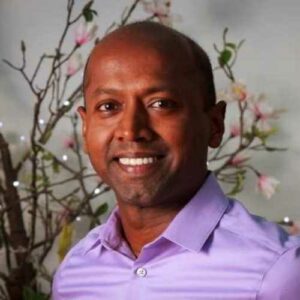“The Frugal Economy: Building a Better World With Less” … Navi Radjou is a joyful guy, an uplifter, and a catalyst for positive change
August 1, 2024

Navi Radjou is a joyful guy. A friend, a great thinker, and inspiration.
I first met him almost 20 years ago, as a fellow new entrant to the Thinkers50 radar of new business thinkers. His beaming face and infectious laugh are enough to like him immediately. And then he tells his story, of where he has come from, and what matters to him.
Navi describes himself as “an uplifter”, which is perhaps what we all need after a year of pandemic lockdown, fear and anxiety, and economic uncertainty.
In a recent email, he told me how he was that week moving to a new apartment just across the road from New York’s Central Park. To me this seemed like a big upheaval, especially during a pandemic, but he reassured me that with every move he finds himself with less possessions – living light, you might say.
Another word is frugal – which is perhaps what he is best known for – or rather the concept of “frugal innovation”. Labelling himself as a French-American, who grew up in Pondicherry in south-eastern India (made famous by the book, Life of Pi), he has a passion for how companies can innovate faster, better, and sustainably in today’s tech-driven, resource-constrained global economy that is increasingly shaped by climate change.
Big idea
His next big idea is “conscious design” which he describes as “the ability to integrate our thinking, feeling, intuiting, doing”.
“When I turned 45, I reflected on my life and saw a pattern. Until then, I had treated the various aspects of my background — my Indian roots, French education, and my professional life in the USA — as distinct. I realised that the time has come for me to integrate these unconnected dots of my background into something more holistic.
“I also see this reflected in our times. We are entering what I call The Age of Convergence, in which first-world and third-world issues like climate change, escalating pollution, social inequality, chronic illnesses, are converging to create ‘problems without borders’ that affect every person on Earth irrespective of gender, skin colour, or income level.”
As the world struggles to fight the Covid-19 virus, we can see this challenge more clearly than ever – “until we are also safe, nobody is safe” – in the need to share and support vaccinations in every corner of the planet.
“The human race needs to transcend its superficial differences and converge toward unity so that all men and women can join forces to co-create solutions without borders that overcome the wicked problems afflicting entire mankind.”
He says that he sees this convergence happening in himself as he seeks to integrate the rich aspects of a multicultural background — the millennia-old Indian spiritual wisdom, the French tradition of rational thinking and scientific analysis, and the entrepreneurial spirit of Silicon Valley — to gradually become a “whole” person.
So what does this mean in practice? As we recover from Covid-19 we need to design new products and services, processes and experiences with emphasis on safety, health, and sustainability. However, even more importantly, he says, we also need to design
- new organizational structures (to accommodate virtualised/decentralised workplaces and drive bottom-up innovation)
- new wise and resilient leadership models that foster diversity and thrive on ambiguity
- new collaborative industry value networks (that encourage co-creation rather than competition
- new inclusive/regenerative socio-economic ecosystems like the frugal economy (the title of his bestselling book).
- new grassroots political governance (like participative democracy).
All the above activities, he suggests, are focused on designing a better outer world, yet we should perhaps pay more attention to also creating a better inner life.
“There is a spiritual revolution under way as more people, especially Gens Y/Z seek meaning in life. As such, we all need to become conscious designers of our subjective inner life” he says.
“To consciously design a more purposeful life, one needs to harness and integrate four inter-related faculties related faculties: thinking (mind), feeling (heart), intuiting (soul), and doing (body).”
Radjou intends to infuse this holistic and integrative perspective into his work so that he can inspire people worldwide to create a better future. “Conscious design will be key to crafting a fulfilling personal life and to co-create conscious organizations and conscious societies of the 21st century.”
Here is my latest World Economic Forum article on Triple Regeneration, a new “caring” paradigm that goes beyond sustainability and CSR.
New book
And now, I’m so excited that his new book is finally here: The Frugal Economy.
Great title. A book has immediate power when it defines a new paradigm, a new way of thinking, and winning. This book does. Particularly the subtitle.
Or as Navi puts it, “Humanity’s pursuit of greatness meets the reality of finite resources”.
In the book he delivers an incisive and engrossing treatment of how human beings facing climate change can reconcile our built-in drive to “do more” and “be better” with our planet’s finite resources. You’ll discover how we can thrive within planetary boundaries while achieving sustainable growth for generations to come.
He says “the book offers a wise middle path between degrowth and hypergrowth.”
It’s enriched with over 100 inspiring examples, helping you to explore how to create greater value with less and find:
- Practical strategies for doing more with less, benefiting both people and the planet
- Success stories of businesses fueling transformative megatrends like B2B sharing, distributed manufacturing, and triple regeneration
- Insights into reshaping economic systems to promote social and ecological harmony
He, and the book, are catalysts for positive change.
More from the blog